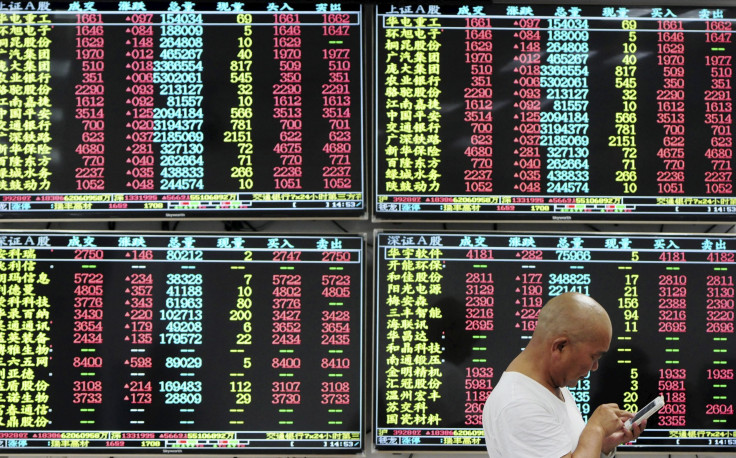Asia Markets Update: Indexes End Morning Session Mixed, As Concerns About China's Economy Peak

Update as of 4:28 a.m. EDT: Chinese markets finished trading Friday marginally ahead, with the Shanghai Composite Index adding 2.34 points to end up 0.073 percent while Hong Kong's Hang Seng Index was up 0.63 percent.
Asian markets have endured a volatile week, rising early on, after China's government pledged to take action to maintain economic growth, but dropping later in the week, as concerns grew about a possible move by the U.S. Federal Reserve to raise interest rates next week, and weak economic data from China and Japan.
In South Korea, the Kospi fell 1.06 percent while Japan's Nikkei finished the day's trading 0.19 percent down. Meanwhile, India's benchmark S&P BSE Sensex was up 0.24 percent as afternoon trading continued.
Original story:
Asian stock markets moved in and out of negative territory during early trading Friday after a week of ups and downs, with investors uncertain about the possibility of the U.S. Federal Reserve raising interest rates for the first time in nearly a decade.
China's Shanghai Composite Index closed the morning at 3,195.54, down 0.07 percent while Hong Kong's Hang Seng closed up 1.03 percent, or 221.97 points, at 21,784.47. Japan's Nikkei opened 0.75 percent lower but later rose 0.17 percent into positive territory, and appeared poised to end a volatile week over 2 percent higher.
Japanese government data released before the market opened showed large manufacturers’ sentiment had turned positive in the July-September quarter, suggesting that the companies were taking China’s recent slowdown in stride.
South Korea's benchmark Kospi, after being the one bright spot in Asia Thursday, was down 0.9 percent at 1,945.1 points. The Bank of Korea left its benchmark rate unchanged at 1.5 percent Friday, the BBC reported.
Overnight in the U.S., the S&P 500 closed up 0.5 percent, the Dow Jones Industrial Average was up by 0.5 percent and the Nasdaq Composite was up by 0.8 percent. Wall Street rallied on hopes that next week's meeting of the Federal Open Market Committee (FOMC) would see a delay in a September interest rate rise, the Financial Times reported.
In addition, investor concerns about weakness in the Chinese economy were at their peak, according to Societe Generale, whose so-called newsflow indicator -- a four-week average of news articles related to a hard landing in China -- this week climbed to the highest level on record, according to MarketWatch.
“Markets have been wild and fear is still near its zenith,” Tim Shirata, Los-Angeles based executive vice president at Guild Investment Management Inc., told Bloomberg. “Pessimism about China and the world economic outlook is widespread, and optimism about continued economic growth in the U.S. is declining. We hold a lot of cash, and are waiting patiently for opportunities to invest it.”
© Copyright IBTimes 2024. All rights reserved.




















